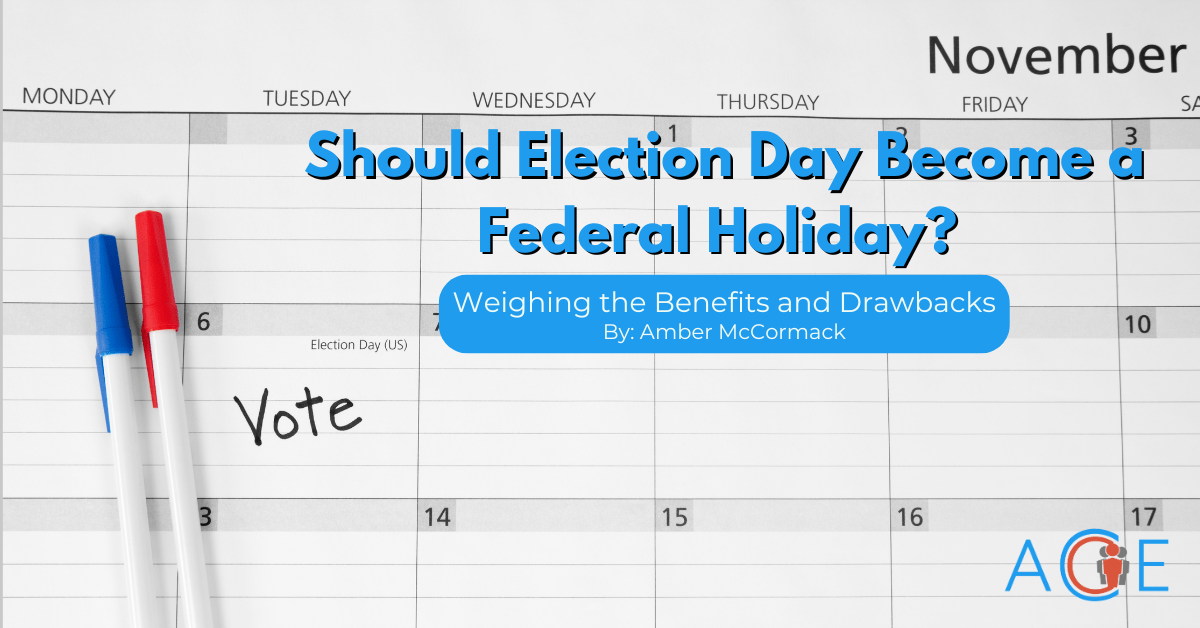Is it time to make Election Day a federal holiday? 🗳️ Some say it would boost voter turnout and align the U.S. with other democracies, while others argue it could create challenges for hourly workers and cost millions. Dive into the debate over whether a federal voting holiday is the best way to strengthen democracy or if there are better solutions. Check out the full breakdown!



So many things to fix about our broken democratic institutions. Every state should have mail-in voting as well as early voting. Every state should automate the registration of voters as much as possible as well. And sure, election day should be a federal holiday, or moved to Sunday or Saturday, at least.
Other things to work on: ranked choice voting and getting rid of the nasty racist holdover that is the EC. Also, we need to remove the special privileges that rural land has over people. Way too many ways our current system gives remote areas more representation than they should have…
Good points except for Ranked Choice. That archaic voting system is a sort of poison pill.
It doesn’t actually solve any of the problems proponents claim it does, and it adds complexity and additional points of failure. It was designed in 1788, but rejected for use in France at the time due to the habit of eliminating the Condorcet winner. (The person who would win in a one on one election vs all other candidates)
The bad idea was then reinvented in the early 1800s as the Single Transferrable Vote, with no fixes for that pesky Condorcet issue.
No, the way to go is either the simplicity of Approval, or the more granular STAR. (STAR is the new hotness, designed this century, with the pitfalls of past systems in mind)
Both systems are completely immune to the Spoiler effect while also allowing, or even encouraging the growth of third parties.
My impression is that when most people mention “ranked choice” voting, what they really mean is “ranked choice voting with instant runoff” which is functionally identical to STAR voting.
The two are not functionally identical at all.
Ranked Choice is a broken Ordinal voting system.
All Ordinal voting systems are flawed, because when you have to rank A over B, you will eventually reach a point where C can become a spoiler candidate.
Cardinal voting systems are immune from this, because you rate the candidates independent of each other. It doesn’t matter how many candidates are on the ballot, because you’re rating them vs your support, not their rank vs each other.
Cardinal systems allow you to rate two candidates the same, either with full support or full disdain.
Do you have a link that explains what you’re talking about? I’m having a hard time reconciling my understanding of Ranked Choice (with instant runoff) with the downfalls you describe.
Edit: I came across this: https://betterchoices.vote/Cardinal It explains the spoiler problem with Ordinal voting systems, but also illustrates problems with Cardinal voting systems. Interesting stuff.
Ahh, the bullshit “bullet voting” nonsense.
That’s a sort of made up problem with cardinal systems that ignores one tiny little issue. Approval, is a Cardinal voting method that is 100% bullet voting, because there’s no scale. Just a simple yes and no per candidate.
It gives better results than every single Ordinal system.
These geeks study election systems in far too much detail. And have a handy little chart of Baysian Regret Basically they did math and computer shit to figure out how “happy” people would be with the results of a set number of simulated elections with roughly identical factors except the voting system used and how honestly vs strategic you are in your voting,
Approval, which is 100% bullet voting, and still comes out better for overall satisfaction of results than its closest Ordinal competitor.
Consensus is just Condorcet voting. Technically, Approval is Condorcet compliant. It might actually be the only true way to find the Condorcet winner.
Anyway, there’s more, and I should link more.
https://en.wikipedia.org/wiki/Approval_voting
https://en.wikipedia.org/wiki/Arrow's_impossibility_theorem
How do you counter the arguments about strategic votes in Cardinal voting systems? Those arguments are explained here: https://betterchoices.vote/Cardinal
Put simply, Approval is still subject to strategic voting that undermines the purpose of the system. In practice, nobody is going to approve of a centrist candidate from the other party because that approval vote might be the only reason that their party loses.
Strategic voting in cardinal systems is just voting.
You have to decide if you like someone enough to vote for them or not.
Unlike Ordinal voting systems where you must rank someone above or below someone else, Cardinal systems count votes for candidates independently of each other.
Your main avenue for strategy is deciding if you support someone or not. Being honest is best, but at times you might decide to include someone who you don’t necessarily love, but find acceptable.
So, your example of the centrist. You might feel like they have a chance of beating someone worse, and thus you can mark yes on them. That doesn’t negate the yes you gave to the candidate you actually love.
And if your guy doesn’t win, well, that’s an election. Sometimes your side loses, and nothing you do can change that. I will say, under Approval or STAR, you literally cannot cause your side to lose by supporting them.
(Causing your side to lose because you supported them is something that happens with regularity under Ordinal voting systems, often referred to as the Spoiler Effect)
Also, that site seems to ignore the fact that you can rate candidates the same under Cardinal systems, It’s pretending that everything is Borda Count, which is an overly complex system that’s only barely a cardinal system. All because their favorite system is Condorcet voting. A system with some serious flaws, but not as many as something like IRV.
Hell, their Range voting example is just fucking weird. Why would you have to choose to rate the candidates lower? If the two candidates are equally appealing to Dems, why didn’t they both get equally high scores?
It’s all nonsense. Just vote how you want under Cardinal systems because strategic voting only hurts you. Seriously, that’s the take away of that site. Be honest and be rewarded, be contrived and “strategic” and you lose.
This explains it better
I’m so glad I found this site! I think I’ve been converted to a Consensus Voting proponent instead of Instant Runoff.
You can read more about it here: https://betterchoices.vote/ConsensusVoting
Specifically, which problem do you think that ranked choice proponents are incorrect about?
Ranked choice voting does one thing, allows people to vote for the candidates they actually want and that’s it. All kinds of people try to shoehorn in other ideas, but at the end of the day the one and only problem its intensed to solve is people having to vote for candidates they don’t like.
See, it’s that one thing you mentioned.
The voting for the candidates people actually want.
That’s what it doesn’t actually do.
What Ranked Choice actually does is remove non-viable third parties from the election. That’s it. You can throw a sympathy vote over to the third party of your choice, but the next line on the ballot will be the major party candidate, because you certainly don’t want the other side to win. Say you throw a vote for the Greens, but your next choice is going to be the main ticket Dem, or else you risk the Republicans winning.
The problem comes when that third party just reaches viability. See, if the Greens are eliminated first, all the votes on the ticket then go to the Dem, but if somehow the Greens slip past the Dems, then the Dems are eliminated first, and the Dem first voters likely didn’t list the Greens as their next choice.
And here’s the thing. Republicans know that if the Greens knock out the Dems, then Republicans win. So a chunk of the Republican base strategically vote for the Greens as their first choice, and Republican as their second. And by lowering the support for their own candidate, they’ve secured the election for that candidate. This is the only voting system in existence that lets you show less support to a candidate to help that candidate win.
Tell me that shit isn’t broken, and I’ll call you a liar.
And that’s just one of a dozen show stopping faults in that voting system.
The next is ballot exhaustion.
If you rate A then B then C, but they get knocked off the ballot B then C and then A, your votes for B and C are thrown out completely. So if literally every single vote listed B as their second choice, B would be eliminated even if they were universally acceptable to the voting public. But it doesn’t matter, they were eliminated in an earlier round so universal support just isn’t looked at.
And finally, what’s the little issue of the rankings themselves. All we know is that you prefer A to B, and B to C. But how much do you actually prefer A to B by. and is that the same amount that you prefer B to C by.
Do you rate A and B as mostly the same but then rate C as a sort of horrible monster who you only begrudgingly support? We don’t know because that info isn’t collected on the ballot. STAR fixes that one, each candidate can have the same score in STAR, and with the scale going 0-5 you can get somewhat granular with your preferences.
If a majority of people vote Republican and they win, that’s a good thing. It seems like you don’t really understand ranked choice voting. It’s not perfect but it’s absolutely better than our current system.
I do understand Ranked Choice, and understand that it’s actually worse than our current system except for one small area. And that’s the elimination of non-viable spoiler parties.
Ranked Choice eliminates them from consideration.
As to its real world application, Ranked Choice is constantly fucking up elections.
https://electowiki.org/wiki/2009_Burlington_mayoral_election
If you’ll notice in that breakdown, the number of exhausted ballots was twice the margin of victory.
All this stems from the fact that RCV is really just First Past the Post, but done a bunch of times on a single ballot.
You cannot solve the problems of plurality by iterating plurality.
It’s a bad system that is, in many ways, worse than the one we already have.